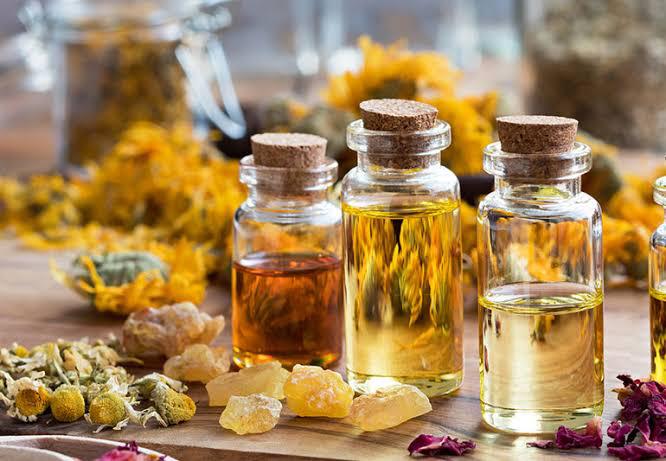⚠️ Medical Disclaimer
Important: This content is for informational and educational purposes only. It should not be used as a substitute for professional medical advice, diagnosis, or treatment. Always consult with a qualified healthcare provider before making changes to your diet, taking supplements, or if you have questions about a medical condition. Never disregard professional medical advice or delay seeking it because of information you read here.
Last Updated on January 18, 2024 by Grace Oluchi
Welcome to MedSpurs’ guide to the benefits of essential oils. Essential oils have been in use for centuries for their healing properties and natural healing benefits. In this guide, we’ll explore the power of 13 essential oils and how they can be in use to support your physical, mental, and emotional well-being. From lavender for relaxation to peppermint for energy, these oils have a wide range of uses and benefits. So, sit back, relax, and let’s dive into the wonderful world of aromatherapy and natural health.
What are Essential Oils?
Essential oils are concentrated plant extracts that are used for their healing properties. They are obtained through processes such as steam distillation, cold pressing, or solvent extraction. Essential oils have been used for thousands of years in various cultures for their medicinal and aromatic benefits.
In ancient Egypt, essential oils were used in religious ceremonies and for embalming. The Greeks and Romans used them for their medicinal properties and in perfumes. In traditional Chinese medicine, essential oils were used to treat a variety of ailments.
Today, essential oils are commonly used in aromatherapy, massage, and natural medicine. They can be used to treat a wide range of conditions, including stress, anxiety, pain, and skin issues. However, it’s important to use essential oils safely and to consult with a healthcare professional before using them as a treatment for any medical condition.
13 of the Oils Plus Benefits and Usage.
Since the beginning of human civilization, people have sought out the benefits of essential oils. Here are 13 essential oils and their benefits and how to use them.
1: Anise (Pimpinella anisum)
Anise essential oil has been in use since the Roman times. It also comes from the herbal plant called aniseed or anise. Anise has the following benefits:
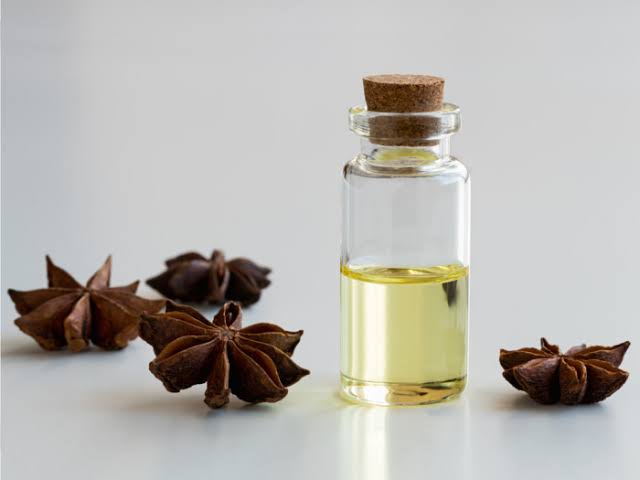

- Aids in digestion — when eaten and also helps ease symptoms of irritable bowel syndrome (IBS).
- Freshen’s breath — according to a study in the Journal of Ethnopharmacology, anise
Freshens breath with just 2 –3 drops added to water for gargling. - Flavors foods — including many popular baked foods, sauces and more.
- Pain relief — when applied immediately to sore muscle or joints.
- Enhances libido — when consumed orally.
- Improves memory.
- Respiratory infections — according to a 2016 study, anise can help with chest colds and respiratory infections when inhaled.
Directions: Use with a diffuser. Place 2-3 drops in diffuser along with water and inhale. You can also place a few drops in a glass of water to take orally.
2: Bergamot (Citrus aurantium var. or Citrus bergamia.)
Bergamot is an essential oil gotten from citrus. It has been in use since the days of antiquity. When mixed with black tea, it results in Earl Grey, a commonly consumed tea worldwide. It’s benefits include:
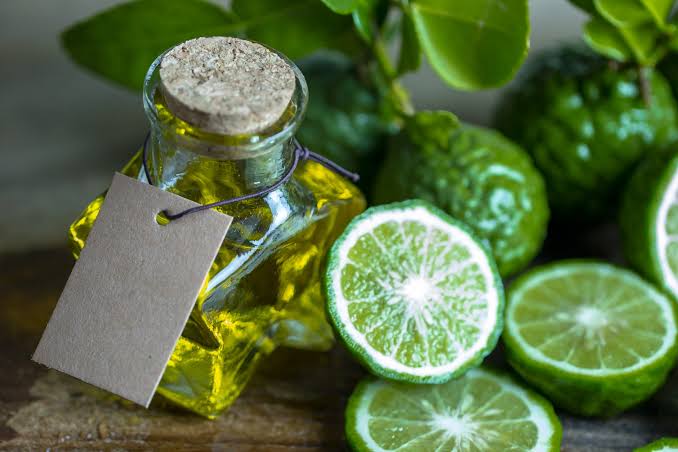

- Aids in digestion — in those with inflammatory bowel disease, according to a study in Clinical Nutrition.
- Lowers cholesterol and reduces heart disease risks.
- Has antibacterial properties, including killing h. pylori, the bacteria that causes stomach ulcers and increases risk for stomach cancer.
- Improves brain function in those with schizophrenia — according to a study in the Journal of Clinical Psychopharmacology.
Directions: Use with a diffuser. Place 2-3 drops in diffuser along with water and inhale. Can also place a few drops in a glass of water to take orally.
3: Clove (Syzygium aromaticum)
Derived from the clove tree, clove is indigenous to Southeast Asia and Indonesia. It has many health benefits, according to a 2014 study, including:
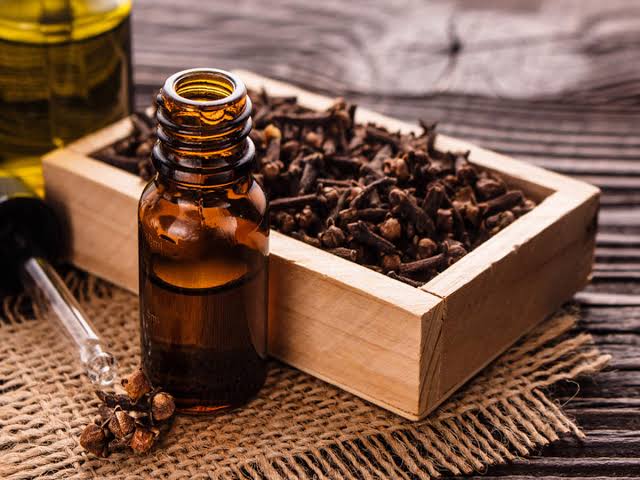

- Food flavoring.
- When applied immediately to wounds, its antibacterial properties can help prevent infection.
- Pain relief properties — apply immediately to sore joints and muscles and can also be in use to cure toothaches.
- Insect repellent — also apply diluted immediately to the skin to keep insects away.
You May Also Read
- Ten Shocking Nutritional Facts You Should know
- Rooibos Tea: Benefits, How To Brew It, And Risks
- 15 ways to keep your hair healthy and moisturized.
- Hibiscus Tea: 8 benefits of drinking of hibiscus tea
- 12 Types of Herbal teas and their benefits
Oral thrush treatment.
Note: If you are on blood thinners, consult with your healthcare provider before ingesting.
4: Eucalyptus (Eucalyptus globulus, Eucalyptus sideroxylon and Eucalyptus torquata)
Eucalyptus is native to Australia, where Aborigines have used this indigenous plant to help treat sinus and also respiratory infections and pain for centuries. Avoid direct consumption of the concentrated oil. It’s benefits include:
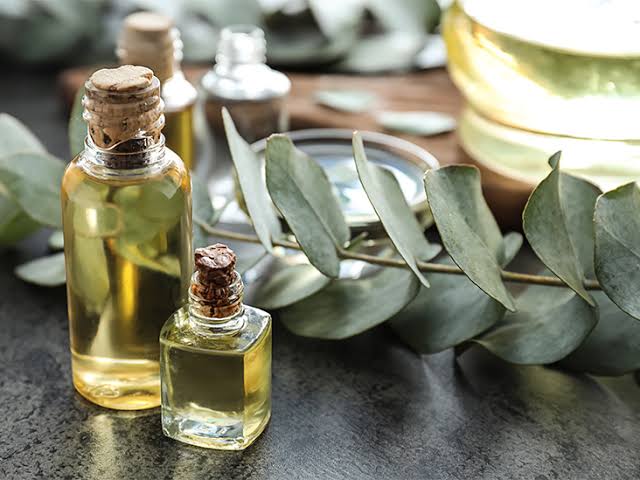

- Food flavoring in teas, jellies and sauces.
- Upper respiratory Infection relief — Inhalation of an herbal mixture containing eucalyptus minimizes symptoms of infection.
- Protection against bacterial skin infections — when applied topically.
- Can kill fungus when applied immediately.
- Natural deodorant — when applied immediately to armpits.
Directions: Use with a diffuser. Place 2-3 drops in diffuser along with cool or warm water and inhale . Can also place a few drops in a glass of water to take orally.
Eucalyptus blends well with lavender and also lemon oils if diffused.
5: Lavender (Lavandula officinalis):
Lavender’s sweet aroma is one of the most known essential oils. The oil has been in use for thousands of years by cultures all over the world. Its first recorded use was by the Greeks and Romans. Lavender can be useful for the following:
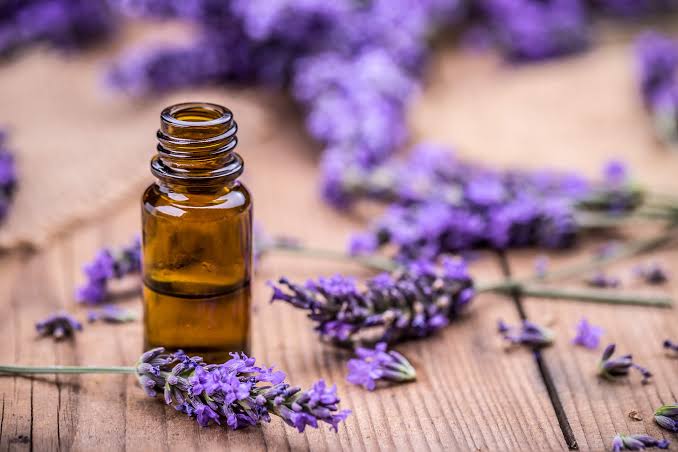

- Stress reduction – Inhaling lavender can help reduce any kind of stress levels.
- Insomnia – Helps improve quality and time of sleep if inhaled.
- Bug repellent – While the smell is attractive for humans, bugs don’t like it.
- Mild burns – Helps reduce pain from burns. Apply directly on the affected area or mix with coconut oil and apply.
- Eczema – Apply directly on dry skin or mix with coconut oil.
- Nausea – Helps lower effects of nausea. Place a drop behind your ears or consume a drop in your mouth or in a small glass of water.
- Acne – Apply immediately to help prevent worse acne.
- Pain relief – Helps provide relief to sore joints and muscles when applied during a massage.
- Anesthesia during surgery – Studies show use of lavender during surgery reduces pain levels when applied immediately.
- Digestion- Aids in the digestive process.
Lavender oil blends well with cloves and rosemary oils. - Hair growth – Researches using animal as models show lavender oil can help with hair growth.
6: Rosemary (Rosmarinus officinalis).
Rosemary is a common herb that often grows in home gardens. It has shown to have many health benefits and plays a big part in the diet of one of the world’s healthiest and oldest living populations, those who reside in Acciaroli, Italy. The uses of Rosemary are as follows:
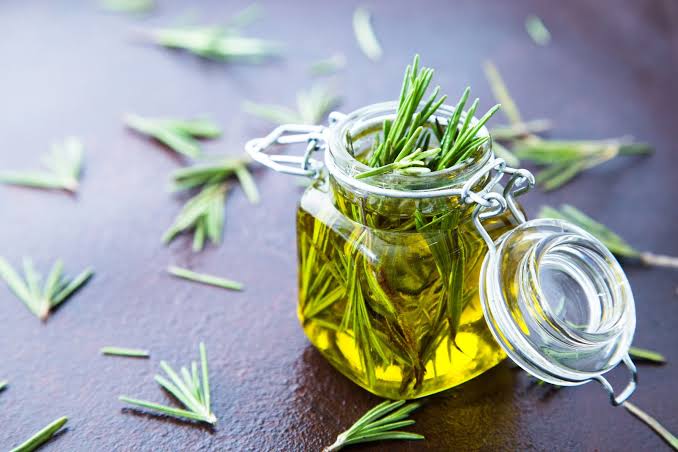

- Memory – A study in 2017 showed “when the rosemary essential oil was inhaled it added to the learning of numbers”.
- Traumatic Brain Injury (TBI) – A 2016 study using animals showed better brain function in injured animal models.
- Hair growth – A 2015 study showed better hair growth when applied immediately to the scalp.
- Upper Respiratory Infections- Inhalation of rosemary lowers symptoms of infections.
- Massages – This oil helps to relax muscles when used during a massage.
- Antioxidant – Rosemary is a potent antioxidant according to studies.
Note: A lot of people may be sensitive to this oil and may have a few skin reactions.
Rosemary blends well with lavender and peppermint oils.
7: Tea Tree (Melaleuca alternifolia)
This essential oil is derived from the leaves of the Melaleuca tree, mostly found in Australia. The aroma of tea tree is described as fresh and healing. Tea tree has the following benefits:
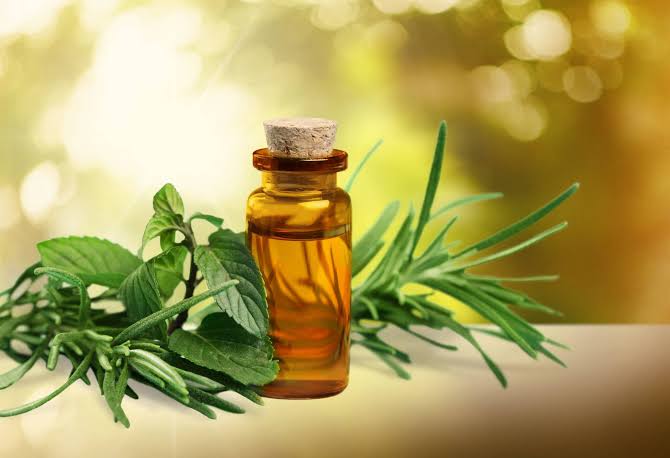

- Antifungal – Studies have shown that this oil has antifungal properties.
- Applied to the skin to treat athlete’s feet.
- Antibacterial – A study in 2017 in mice showed inhaled tea tree oil could be helpful in fighting pneumonia.
- Rinsing one’s mouth out with tea tree oil was helpful in those with inflammation due to gingivitis.
- Wound healing – Apply immediately to help prevent infection.
- Helps control dandruff – Apply immediately to the scalp to help reduce dandruff.
- Insect proof– When applied immediately, helps keep insects away.
Tea tree blends well with lavender and myrrh oil.
8: Lemon (Citrus limonum)
Lemon is a familiar scent, sour and sweet at the same time. This essential oil has many uses. It is widely used in beauty products due to its antioxidant properties and some of its benefits includes:
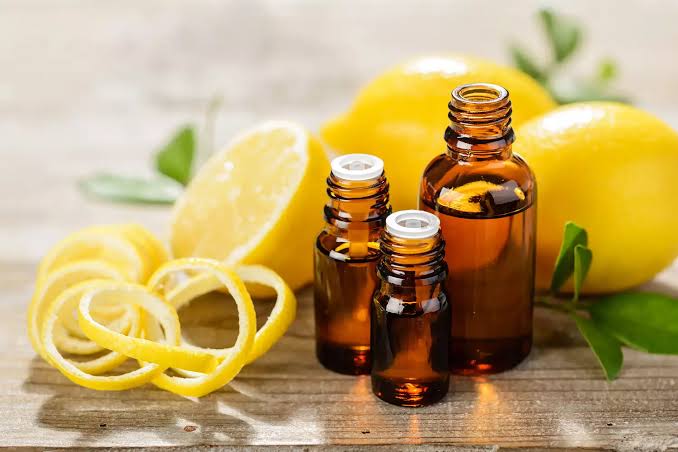

- Indigestion – Taken with a glass of water, it can stimulate the digestive process.
- Insect proof – When applied immediately, it helps keep insects away.
- Disinfectant – Mixed with water, it can be used to gently clean surfaces.
- Sore throat – Antioxidant properties helps kill virus in the throat.
- Skincare – Mixed with coconut oil and applied to the skin, it helps protect against oxidation.
Lemon blends well with eucalyptus oil.
9: Peppermint (Mentha piperita)
Peppermint is a well-known herb and essential oil. It is actually a hybrid of watermint and spearmint. It’s smell is sharp and fresh, and one of its main components is menthol. Recently, it is in use as flavoring in chewing gum. The peppermint is native to Europeans and has numerous health benefits which includes:
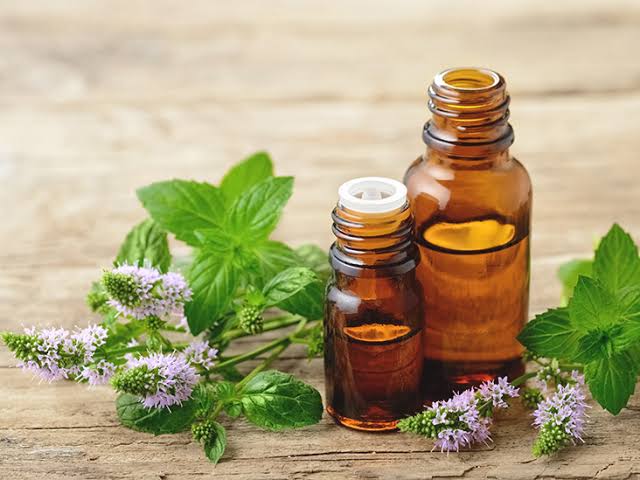

- Irritable Bowel Syndrome (IBS) – Peppermint oil helps improve symptoms in those with IBS.
- Headache – Can also be helpful with tension headaches.
- Food flavoring – Can be added to food for additional flavoring.
- Nail infection – Applied immediately, can also help with fungal infections.
- Protection against skin infections.
- Upper Respiratory Infection – Inhalation of an herbal mixture containing peppermint also lowers symptoms of infection.
- Itching due to pregnancy – when immediately applied, peppermint helps minimize itching due to pregnancy, avoid oral consumption.
- Eczema – Topically applied,also helps minimize skin irritation.
- Hair growth – when applied topically, it could help with hair growth.
Peppermint also blends well with lavender, rosemary and eucalyptus oils.
10: Chamomile (Anthemis nobilis)
Chamomile is commonly in use as a herbal tea for those wanting to get a good night’s rest. It also has a sweet, fruity smell. As an essential oil, it also has numerous health benefits that includes:
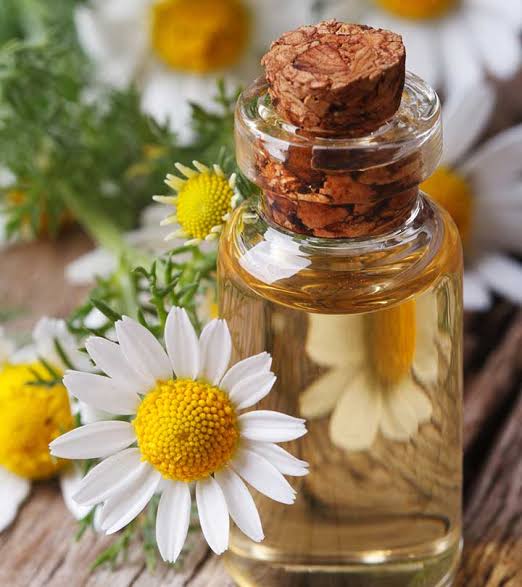

- Anxiety – has a calming effect.
- Depression – an animal model study shows inhalation of chamomile has anti-depression effects.
- Allergies and asthma benefit.
- Anti-inflammatory – apply topically to the affected area.
- Wound healing – studies also show topical application to be helpful in wound healing and preventing infection of skin wounds.
- Insomnia.
- Eczema – when applied topically.
- Muscle spasms – applied topically.
Chamomile blends well with jasmine and also rose oils.
11: Frankincense (Boswellia carterii)
Perhaps best known as a gift given by the Three Wise Men, in the Bible. Frankincense was frequently used in perfumes. It also has a woodsy, balsamic smell. Today, it is commonly used in religious ceremonies, including those by the Catholic Church. Frankincense is also known as boswellia to people in India and Africa, who use it for medicinal purposes, and it was traded in Somalia 5,000 years ago. It’s benefits includes:
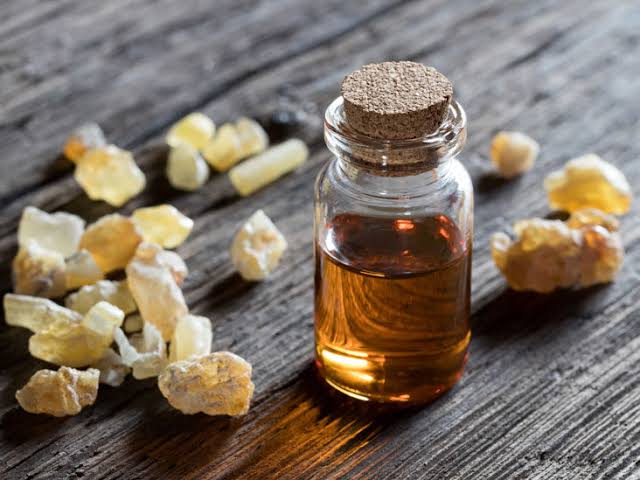

- Prevents yeast infections – Studies show frankincense can kill pathogenic yeast.
- Calming effective – Can help calm the mind, especially when the oil is aerosolized.
- Joint pain – Studies show boswellia can also help pain associated with rheumatoid arthritis and osteoarthritis. Consider rubbing the oil on the affected joint or taking boswellia as an oral supplement.
- Asthma – also Helps reduce inflammation in those with asthma.
Frankincense blends well with lavender and rose oils.
12: Myrrh (Commiphora myrrha)
An essential oil used in antiquity, myrrh was also mentioned in the Bible, in the Old and New Testament 152 times. Further, in India, it is frequently used in Ayurvedic medicine for back and body pain. It’s benefits includes:
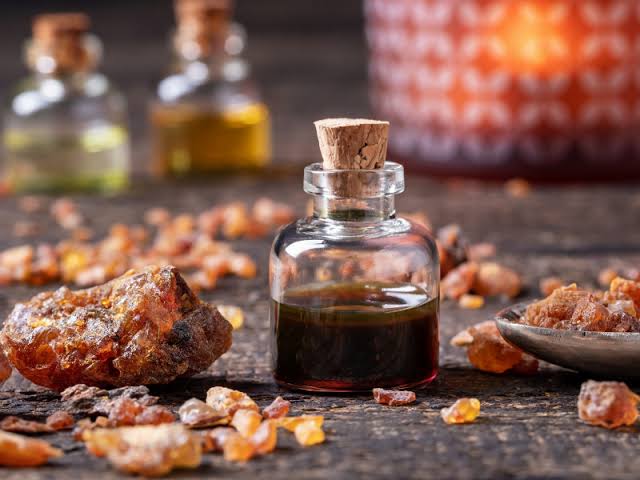

1: Antioxidant – Protects the body from oxidative damage.
- Antibacterial properties.
- Antiviral protection.
- Anti-fungal protection.
Myrrh blends well with frankincense, geranium and clove oils.
13: Ginger (Zingiber officinale)
This herb is in use in foods but also as an essential oil. Ginger has many health benefits which includes:
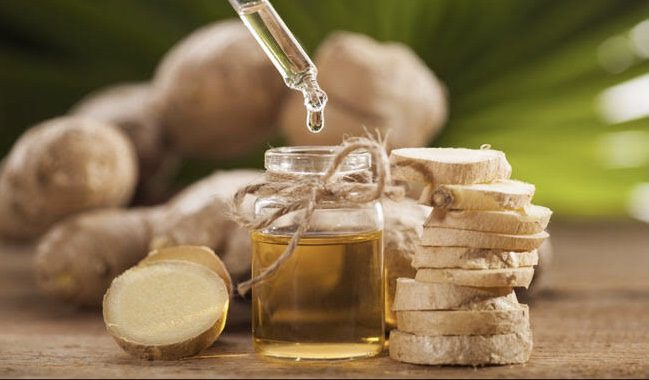

- Anti-nausea – Frequently used by pregnant women and those undergoing chemotherapy to help control nausea.
- Pain relief – Applied topically to the affected joint, has anti-inflammatory properties.
- Laxative effect – also helps move the bowels.
Health Benefits of Essential Oils.
- Reduced anxiety.
- Pain relief.
- Improved sleep.
- Enhanced mood.
- Boosted immunity.
- Reduced anxiety: Essential oils like lavender and chamomile can help reduce feelings of anxiety and promote relaxation.
- Pain relief: Some essential oils, such as peppermint and eucalyptus, have anti-inflammatory properties that can help relieve pain and also discomfort.
- Improved sleep: Essential oils like lavender and cedarwood have also shown to promote better sleep by helping to calm the mind and body.
- Enhanced mood: Certain essential oils, such as orange and lemon, can help boost mood and energy levels.
- Boosted immunity: Essential oils such as tea tree and oregano have antimicrobial properties that can help boost immunity and fight off infections.
What are Some Ways to Use Essential OIls?
- Aromatherapy.
- Immediate application.
- Inhalation.
- Massage.
- Cleaning.
- Aromatherapy: Essential oils can be in use in diffusers, sprays, or also in baths to create a calming or uplifting atmosphere.
- Immediate application: Essential oils can be diluted with a carrier oil and applied to the skin for various purposes. For example, lavender oil can be useful to soothe skin irritations.
- Inhalation: Essential oils can be in a bowl of hot water and inhaled to relieve congestion or ease breathing.
- Massage: Essential oils can be added to massage oils and to the skin to relieve muscle tension or promote relaxation.
- Cleaning: Essential oils like tea tree oil or lemon oil can be useful to cleaning products to create a natural and effective cleaner.
The Key Takeaway.
To sum it up, incorporating essential oils into your daily routine can bring about numerous benefits to your physical and mental health. From promoting relaxation to boosting energy levels, these oils can enhance your overall well-being. By using them in various ways such as through diffusers, massages, or baths, you can easily reap their benefits. So why not give them a try and unlock their potential for a happier and healthier life?
What are essential oils?
Essential oils are concentrated plant extracts that are used for their healing properties. They are often in use in aromatherapy, massage, and other natural health practices.
What are some common essential oils and their benefits?
Some common essential oils and their benefits include lavender for relaxation and stress relief, peppermint for energy and focus, eucalyptus for respiratory support, and tea tree for skin health and immunity.
How do I use essential oils?
Essential oils can be in use in a variety of ways, including diffusing, inhaling, applying topically, and adding to bathwater. They should always be in a diluted form and should be in use with caution, as some oils may cause skin irritation or other reactions.
Can essential oils be harmful?
While essential oils are generally safe when used properly, they can be harmful if used incorrectly. Some oils may cause skin irritation or allergic reactions, and some may interact with certain medications. It’s important to do your research and use essential oils under the guidance of a trained professional.
Where can I buy high-quality essential oils?
High-quality essential oils can be at health food stores, specialty shops, and online retailers. It’s important to choose a reputable brand and to read labels carefully to ensure that you are getting a pure and high-quality product.

